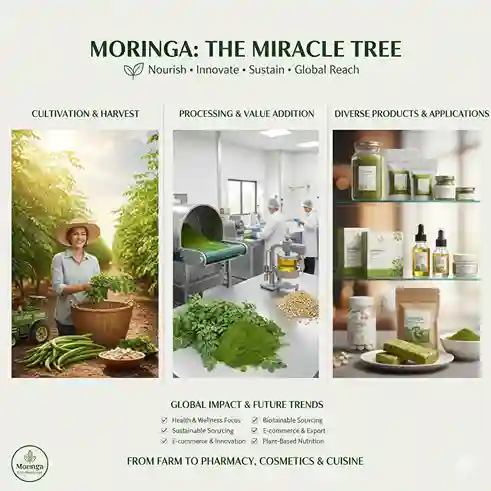The versatility and health benefits of Moringa have made it extremely popular in the past few years. Its leaves are loaded with nutrients while its seeds are jammed with oil, thus making them very useful food for cosmetics or pharmaceuticals.
Moringa farming, as well as the production of its products, has turned to be a profitable business for entrepreneurs and startups because of the increasing worldwide demand for superfoods.
In this article, you will learn how to create a Moringa business strategy step by step-from understanding the market to cultivating and processing it to marketing and scaling the establishment.
Moringa: A Market Analysis
Moringa is really popular and trending now-a-days. Everyone is drinkig Moringa powder with smoothies or populations. The countries that grow Moringa are India, Philippines, and several countries in Africa. The demand, however, is rising in the U.S. and in Europe for organic teas and oils.
If you want to dive into the Moringa business, this is really the time. Stand by and watch what the customers really want and capitalize on export chances. The best part is, Moringa grows very well in those warmer areas. Whether you’re a small backyard grower or a big farm, you can make it work.
Read More: Profitable Moringa Leaf Powder Business Opportunities
Determining The Right Business Model
The business model one chooses depends on the amount of investment and expected revenue. One can create a Moringa business in different ways:
- Moringa farming: You can focus on growing and supplying Moringa seeds, leaves and pods to processors.
- Moringa processing: But if your capital is heavier, you could invest in processing facility lines that will allow you to put into value-added Moringa products, such as powder, capsules, seed oil or tea bags.
- Integrated model; You can have farming and processing both under one roof, and thus control the entire value chain and thus earn profits.
- Export & Retail: The other way of doing business is that it is a lucrative way of creating an international brand or directly supplying buyers.
Most entrepreneurs will counsel that it’s best to start small and then scale up gradually.
Read Our Project Report: Click Here
Land selection and cultivation
The most appropriate places for Moringa growth lie in the tropical and warm semi-arid climates. The soils that are well drained and get maximum sunlight are selected. It is drought resistant and needs little care in comparison to the cash crops. Therefore, it is economical for farmers.
- Planting Moringa is propagated from seed or cuttings. Plant spacing is critical as commercial plantations generally adhere to a spacing of 3 meter by 3 meters.
- Water and Soil: Though Moringa grows well on dry soils, irrigation is necessary at the early stages of its growth to ensure healthy yields.
- Fertilization Organic manure or compost is ideal for reducing production costs and ensuring chemical-free farming.
- Harvesting Intake of leaves occurs within 6-8 months, while pods and seeds mature after one year.
Proper investment in quality seeds and a proper soil management will result in higher yields and more quality products.
Read More: The Business of Aloe Vera Juice and Gel: Increasing Opportunities for Growth
Process and value addition
Processing raw materials into high value products is one of the most profitable areas in Moringa. For example, you could do
- Moringa powder: Dried leaves and ground are packaged into jars, sachets, or pouches for health-conscious customers.
- Moringa tea: Dried leaves packed in tea bags; or loose leaf tea.
- Moringa seed oil: The extracted oil for skin care and cosmetic use.
- Moringa capsules and supplements: There seems to be a growing market for easy to consume supplements.
- Fertilizer and animal feeds: Unused plant material could be converted to organic fertilizers for livestock or nutritional feed.
Add-value to-your-product as much as possible to boost profits.
Infrastructure and Machinery
The basic equipment required to start a processing unit includes:
- Leaf dryers, pulverizers and powder makers
- Oil extraction units for seeds oil
- Capsule filling machines
- Packaging equipment for tea, powders and oils
In case of tight budget, perhaps having semi-automatic equipment for your initial set up would be fine. However, if you are much larger, most probably you need to invest in an automated system which will improve efficiency and meet export standards.
Read Our Book: Click Here
Branding and Marketing
Your Moringa business will succeed if you have a strong marketing strategy. Natural Organic Healthy Branding attracts consumers. Here are some tips.
- Highlight Benefits: Tell them Moringa’s nutritional value and medicinal benefits.
- Eco-Friendly Certifications: Certified organic and eco-friendly certifications will help you to stand out on premium markets.
- Digital marketing: Use websites, social media and ecommerce platforms to reach buyers around the world.
- Export Opportunities: Joint venture with strategic international wholesalers, distributors, and bulk sellers for bulk sales.
Sell purified, healthy and sustainable superfoods like Moringa.

Investment and Profits
The investment needed to start a Moringa business would include equipment, seeds, irrigation systems, and land preparation. Prepare for other initial costs too. The processing of the Moringa plant adds additional costs, including machinery and packaging. Moringa is a multi-revenue plant, so the returns on investment will be high.
Moringa powder, for example, is sold at premium prices on both the domestic and international market. You can reach profitability in the first two-years by building a solid supply chain.
Read More: Manufacturing Of Moringa Oleifera Products as a Successful Business
Scaling Up Your Business
Scaling up your Moringa business becomes easier once you have established it. Here are some ways to scale up:
- Increase the area under cultivation
- Introduce new products like Moringa honey and skincare items
- Create partnerships with retail chains and export houses
- Investing in new technology will improve efficiency
- Look for B2B opportunities in the cosmetic and health industry
You can capture more market share by scaling strategically.
What are the challenges and how to overcome them?
Moringa farming is no different. Farmers might face pests, improper techniques for drying, or a lack of awareness about the market. Obtaining organic certification is also a time-consuming process.
These challenges must be overcome:
- Natural pest control methods and good agricultural techniques are recommended.
- To maintain the quality of your product, invest in proper drying and storing.
- Make connections with agricultural experts to receive training.
- Consult with consultants for certification and export clearance.
Find the Best Idea for Yourself With our Startup Selector Tool
The Future of Moringa Business
The future looks bright for the Moringa Industry. Moringa is a great choice for consumers who are moving towards organic and plant-based diets. Superfood cultivation is also being promoted by governments and private investors.
Moringa is a great investment for entrepreneurs who want to build a profitable and sustainable business.
Moringa Business Plan: Frequently Asked Questions
1. How much land do you need to start a Moringa Farm?
Start with just one acre. For commercial production, however, 5-10 acres are ideal. Both small and large-scale plants can grow well.
2. What is the profitability of Moringa?
Moringa is a highly profitable business because there is a high demand for its oil, powder and supplements. Branding and marketing your products can triple or double your profits.
3. Do I require organic certification in order to sell Moringa?
It is not necessary to obtain organic certification for domestic sales, but it is recommended if your goal is to export or sell in premium markets.
4. What are the most common uses of Moringa?
Moringa can be used as a food supplement, a skincare ingredient, an animal feed, a fertilizer and even a water purifier. It is therefore versatile and profitable.
5. How can I sell my Moringa product internationally?
List your products on global platforms for e-commerce, attend food fairs and partner with distributors to market internationally. Certifications and attractive packaging are also helpful.






